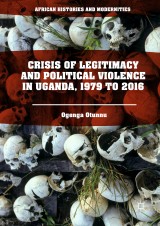Details

Crisis of Legitimacy and Political Violence in Uganda, 1979 to 2016
African Histories and Modernities
|
85,59 € |
|
| Verlag: | Palgrave Macmillan |
| Format: | |
| Veröffentl.: | 07.08.2017 |
| ISBN/EAN: | 9783319560472 |
| Sprache: | englisch |
Dieses eBook enthält ein Wasserzeichen.
Beschreibungen
This book, the second of two parts, demonstrates that societies experiencing prolonged and severe crises of legitimacy are prone to intense and persistent political violence. The most significant factor accounting for the persistence of intense political violence in Uganda is the severe crisis of legitimacy of the state, its institutions, political incumbents and their challengers. This crisis of legitimacy, which is shaped by both internal and external forces, past and present, accounts for the remarkable continuity in the history of political violence since the construction of the state.
<p>1. Introduction.- 2. Political Violence under the Uganda National Liberation Front (UNLF) 1979-1980.- 3. Political Violence under the Obote II Regime, 1980-1985.- 4. Political Violence during the Tito Okello Regime, July 1985 to January 1986.- 5. Political Violence under the Museveni Regime, 1985-2016.</p><p> </p>
Ogenga Otunnu is Associate Professor at DePaul University, USA, as well as the founding Director of the Graduate Program in Refugee and Forced Migration Studies at DePaul and co-founder of the Center for Forced Migration Studies at Northwestern University, USA. He has lectured at the summer program on refugees and forced migration at the Centre for Refugee Studies at York University, Canada, for fifteen years and has trained human rights organizations and NGOs working with displaced population in every region of the globe. He is a consultant for the UNHCR, other international and regional organizations and governments. He has published extensively on genocide, political violence, refugee and forced migration, nationalism, African philosophies, crisis of legitimacy, the African state, the African Renaissance, and human rights.<br/>
This book, the second of two parts, demonstrates that societies experiencing prolonged and severe crises of legitimacy are prone to intense and persistent political violence. The most significant factor accounting for the persistence of intense political violence in Uganda is the severe crisis of legitimacy of the state, its institutions, political incumbents and their challengers. This crisis of legitimacy, which is shaped by both internal and external forces, past and present, accounts for the remarkable continuity in the history of political violence since the construction of the state.<p></p>
Completes a two-volume set that comprises the first comprehensive account of the systematic violence in Uganda Explores why political and social violence persists particularly in reference to state legitimacy Gives a comprehensive and nuanced overview of political violence in Uganda Includes supplementary material: sn.pub/extras
“Ogenga Otunnu’s extensive examination of political violence in post-Amin Uganda is a masterpiece of critical investigation. It provides new insights on the manner in which political violence was a feature of the Obote—2 and Tito Okello governments in the early 1980s, emphasizing the need for re-engaging with the question of regime hegemony. Finally, it provides an extensive examination of the civil war in Northern Uganda, offering incisive explanations for the persistence of political violence even under Yoweri Museveni’s thirty-year rule, challenging the dominant narrative which claims a restoration of peace and demonstrating that the relative tranquility of the era masks a much deeper crisis of sustainable governance and state legitimacy.” (J. Oloka-Onyango, Professor, Makerere University, Uganda)<p></p>
Diese Produkte könnten Sie auch interessieren:

The Last Samurai - Japanische Geschichtsdarstellung im populären Kinofilm

von: Daniel Scherrer

34,99 €















